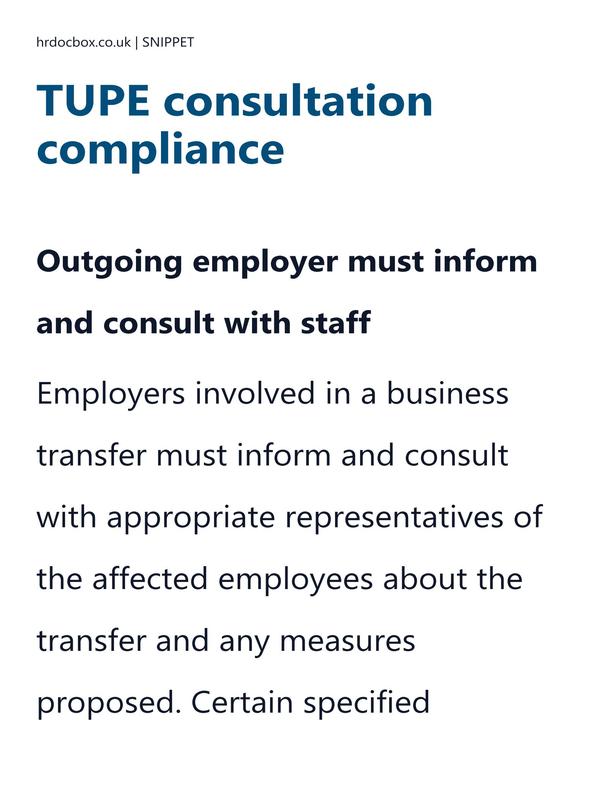Managers guide to TUPE consultation compliance


This guide outlines the main legal requirements surrounding TUPE transfers, as well as the essential steps involved in managing such transfers, together with some good practice guidance.
- Includes 12 months' access to the Managers guide to TUPE consultation compliance, with all updates provided free of charge and notified to you.
- UK-specific accuracy.
- 500 words over 2 pages.
- Last updated 27/03/2023.
- Format: Word / PDF / plain text / email.
- Delivery: Instant download after purchase (no physical item).
- Access: Download link shown here after checkout.
- This Managers guide to TUPE consultation compliance will SAVE you up to 1 hour 30 mins research, save you money, and reduce your risk.
Managers guide to TUPE consultation compliance
Outgoing employer must inform and consult with staff
Employers involved in a business transfer must inform and consult with appropriate representatives of the affected employees about the transfer and any measures proposed. Certain specified information must be provided to the representatives long enough before the transfer to enable the outgoing employer to consult with them about it.
If there are any changes or proposals for changes following the transfer, these measures will have to be discussed with the representatives of the affected employees. The new employer is required to provide the old employer with information on proposed measures to allow the old employer to comply with their duty to inform and consult. There is no set timetable for consultation, but the larger the transaction and the more staff affected, the longer the timetable will need to be.
If there is a failure to inform and consult, a complaint can be made
This is a 30% preview of the Managers guide to TUPE consultation compliance. For instant full access, purchase this item or a parent bundle.
Managers guide to TUPE consultation compliance purpose
This Managers guide to TUPE consultation compliance aims to offer you a versatile and customisable tool, serving as a solid foundation for your needs. Utilise it to ensure consistency, enhance accuracy, and save valuable time.
Adapt it to suit your unique requirements, ensuring efficiency and effectiveness in your HR processes.
Frequently Asked Questions about a Managers guide to TUPE consultation compliance
Frequently Asked Questions about a Managers guide to TUPE consultation compliance
-
Can I use the Managers guide to TUPE consultation compliance in my small business?
Yes. The Managers guide to TUPE consultation compliance is designed to be flexible and suitable for organisations of all sizes, including small businesses and charities. It follows UK employment law best practice, so even if you don't have an in-house HR team, you can confidently apply it.
-
Is the Managers guide to TUPE consultation compliance compliant with 2026 UK employment law?
Absolutely. Like the Managers guide to TUPE consultation compliance, all of our templates are drafted with the latest ACAS guidance and UK employment legislation in mind. We review and update them regularly, so you can be confident they remain compliant.
-
Can I customise the Managers guide to TUPE consultation compliance for my organisation?
Yes, we highlight the areas of the Managers guide to TUPE consultation compliance that you need to update with your own details, and where you need to make decisions to suit your situation. This saves you time and ensures that you meet best practice.
-
Do I get instant access to the Managers guide to TUPE consultation compliance?
Yes. Once purchased, you'll be able to download the Managers guide to TUPE consultation compliance instantly. Templates are provided in editable Word or Excel format so you can customise them easily, and in PDF format for easy sharing.
-
What if I need more help, not just a Managers guide to TUPE consultation compliance?
If you're looking for broader support, we also offer toolkits and library bundles that include the Managers guide to TUPE consultation compliance, along with other HR templates and policies for fully managing your situation. These may be more cost-effective if you need deeper advice.
-
Why should I use this Managers guide to TUPE consultation compliance, and not AI to generate it?
The risk of using a free AI-generated template 'without review' includes your legal exposure, missing context, and no awareness of the wider process, whereas purchasing the Managers guide to TUPE consultation compliance from us mitigates that risk.
